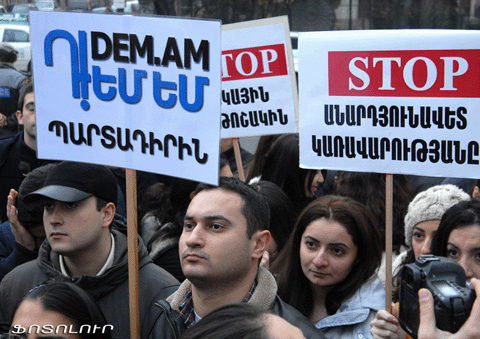Democracy vs Autocracy: A Fight for the Future
- (0)
Democracy vs Autocracy: A Fight for the Future –
By Serouj Aprahamian
The Armenian Weekly
A capacity crowd filled the halls of Yerevan’s National Opera and Ballet Theater on Feb. 10 for a performance of the “Anoush” opera. Instead of a classic cultural evening, however, they found themselves in the middle of a contentious social battle gripping the nation.

Thousands gather in Yerevan’s Freedom Square in protest against a reform that would force citizens to make monthly payments to private pension funds.
As the show was set to begin, an opera administrator suddenly appeared before the crowd and announced that the event was being postponed. The performers, he said, were sick.
But the truth of the matter awaited opera-goers outside. As attendees walked out to get their refunds, they were met by scores of staff and artists, flanked by activists, chanting “Menk enk terruh mer yerkrin” (We are the owners of our country) and “Dem enk partadireen” (We are against the mandatory system).
The performers, it seemed, were sick from a controversial pension privatization reform being pushed by the government. The new law requires Armenians younger than 40 to make mandatory contributions of up to 10 percent of their salaries to private pension funds selected by the government.
The U.S.-backed privatized system—an extreme model only adopted in a handful of countries such as Chile, Kazakhstan, and Estonia—was set to take effect in Armenia on Jan. 1. But the Constitutional Court issued a temporary freeze on the law following a challenge filed by four opposition parties represented in parliament. They are set to rule on whether the mandatory pension payments are constitutional on March 28.
Despite the High Court’s freeze, the government has put pressure on employers to move forward with wage deductions foreseen in the reform. Both the Central Bank and State Tax Service issued official statements contradicting the legal suspension and warning employers to pay the deductions now to avoid facing “heavier consequences” in the future.
President Serge Sarkisian himself has publicly campaigned for the measure, hailing it as a “great program” which—although he himself admitted is opposed by 80 percent of the population—will be considered “historic” by future generations.

A young protester holds a Dem.am civic initiative sign during a Jan. 18 rally against the mandatory privatized pension system.
Meanwhile, the public backlash against the law has been nothing short of unprecedented. At the forefront have been young activists, mostly from the budding IT sector, who have coalesced around a non-partisan civic initiative named “Dem Em” (I Am Against). This young crop of new activists has galvanized a broad cross-section of society through their sophisticated use of online resources (such as their website Dem.am) and campaign techniques against the reform.
Also, for the first time in recent history, the main opposition political parties are working together in unison. This long-desired development (for many) has not been seen since perhaps the rigged presidential elections of 1996.
What’s more, the political parties are, for the first time, taking their cues from a non-partisan civic initiative. There is no question that the frontline of the movement are the professionals and young activists mobilized around Dem.am.
Even traditional, lower wage workers have entered the fray. Labor strikes and threats of stoppages have taken place by railway, metro, and electricity workers in response to the pension reform.
In a country with no labor movement to speak of, such spontaneous actions are truly telling of the state of social discontent. They point to the extent that even unorganized state employees are willing to go—under the threat of pressure, firing, and blacklisting—to express their opposition.
This wave of popular activism and mobilization holds the potential of being an extremely powerful force for social change. As one local newspaper pointed out, “If the interests of an opera singer and ordinary train conductor have started to converge [add on top of this IT professionals, student activists, and opposition political parties], there is nothing stopping them from joining forces and fighting together for the same goal.”

An anti-pension reform Dem.am sticker adorns the frame of an HSBC teller machine in Yerevan. Financial institutions are to gain thousands of new clients should the private pension reform go through.
It is yet to be seen whether the protest movement can be coordinated to the degree needed to defeat the government’s unpopular measure. However, one thing is clear: There are serious changes in political attitudes and behavior taking place in the country.
A growing segment of citizens are shifting their focus to grassroots mobilization and direct action for social change. This is taking shape in the midst of, and in counteraction to, the state’s continued use of autocratic, top-down, and coercive practices for ramming through regressive policies.
In this way, the current battle over the pension system in Armenia is not just for the future of people’s retirement. It is a critical battle for the very future of the country’s democracy.



















